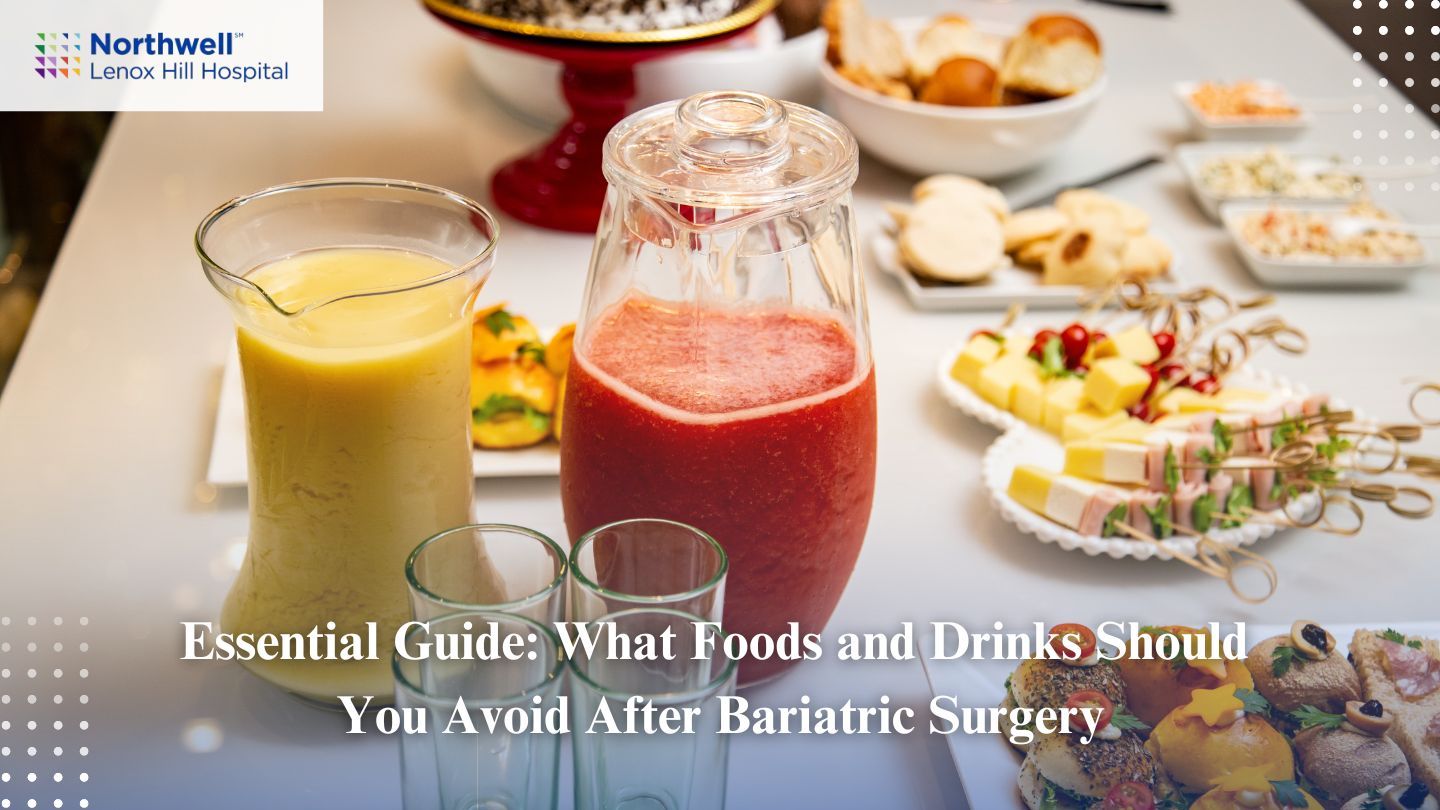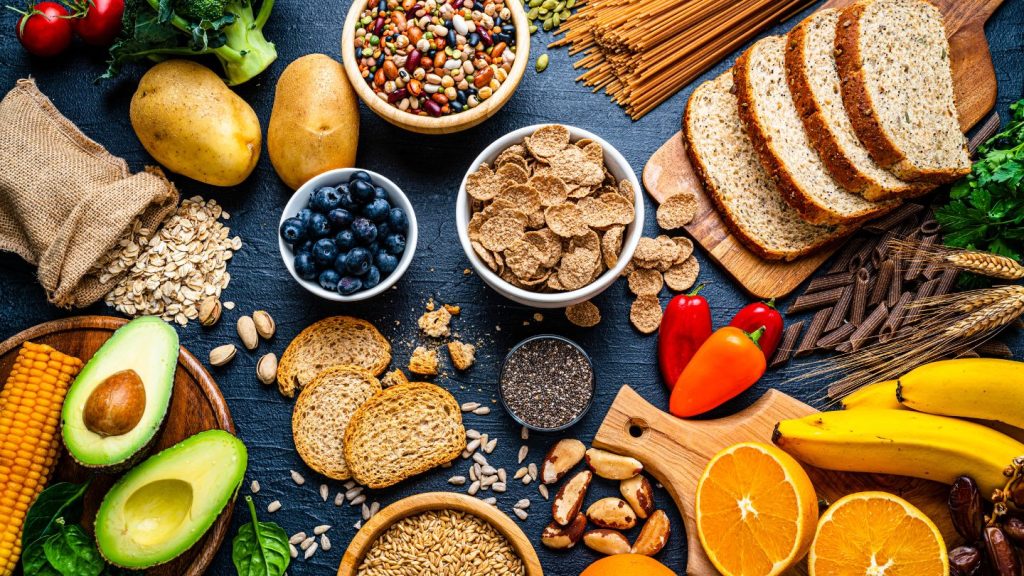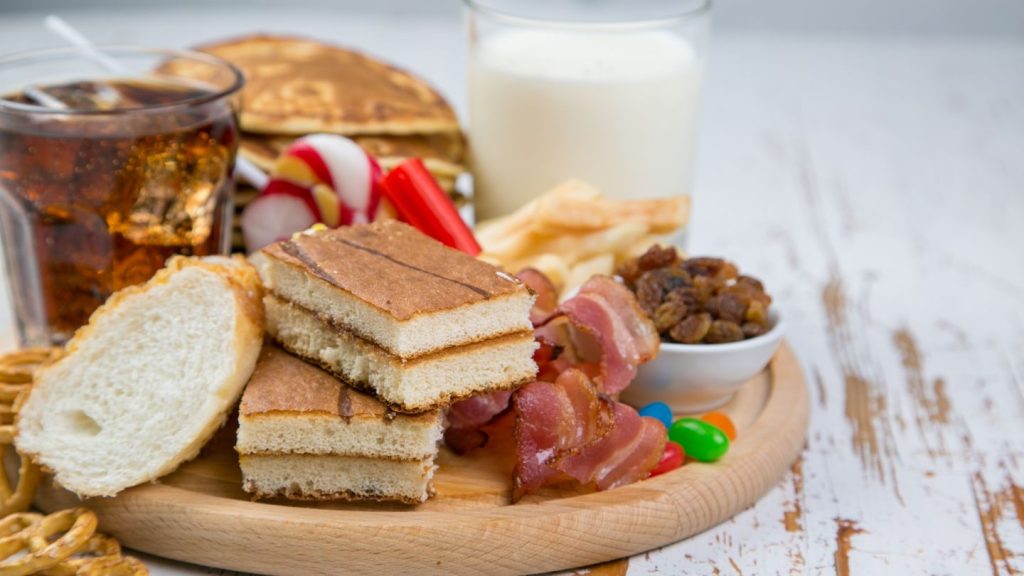
Essential Guide: What Foods and Drinks Should You Avoid After Bariatric Surgery
Understanding what foods and drinks you should avoid after bariatric surgery is essential for your recovery and weight loss success. This guide provides the key items to eliminate from your diet to avoid complications and achieve your health goals.
Key Takeaways
- Post-bariatric surgery, focus on a nutrient-dense diet and avoid foods with empty calories to support recovery and long-term weight loss.
- Avoid tough, dry, and hard-to-digest foods like raw vegetables, bread, and high-fat items to prevent discomfort and enhance digestion.
- Stay hydrated while avoiding sugary, caffeinated, and alcoholic beverages, as they can hinder recovery and negatively impact overall health.
Understanding Your New Dietary Needs

Bariatric surgery significantly diminishes the size of your stomach, which in turn means you’ll feel satiated with less food. To maintain adequate nutrition and steer clear of unease, it’s crucial to consume a diet that is low in calories, fats, and sugary treats. By keeping an eye on both the quantity and nutritional content of your meals daily, you can adhere to these prescribed dietary guidelines.
The procedure also impacts how well nutrients are absorbed by your body. Hence, taking supplements for vitamins and minerals becomes essential for maintaining health post-surgery recovery. Making wise choices about what foods you eat will help prevent discomfort while ensuring proper nourishment. Avoid eating foods high in fat or void of nutritional value to support your recovery and overall well-being.
Concentrating on consuming foods rich in nutrients that promote healthy eating habits throughout this weight loss endeavor ensures high nutritional value even when intake amounts are reduced. Practicing such deliberate consumption is instrumental in aiding not just immediate but enduring success with weight management. Consider food portions and serving sizes to prevent unwanted weight gain.
Foods with Empty Calories
Consuming foods high in empty calories, like cookies, sweets, and snack chips, provides energy but lacks essential nutrients. These items may cause persistent hunger and obstruct your weight loss goals. Post-bariatric surgery, professional nutritionists emphasize the importance of transitioning to a diet rich in protein and vital nutrients. By focusing on foods that aid recovery and long-term health, you can sustain energy levels and support healing.
Professional dietary consultations help you make informed choices about meal planning. Registered dietitians can create customized plans that prioritize nutrient density while avoiding foods that hinder your progress.
Tough or Chewy Foods
Digesting hard or chewy foods such as red meat and fibrous vegetables can be challenging post-surgery. While these foods might be avoided initially, healthcare professionals guide you through a structured reintroduction process when your digestive system is ready. This approach ensures safe and gradual adaptation to more diverse food options.
Surgeons and dietitians recommend options like ground meats, fish, and soft dairy products to ensure proper digestion. Professional advice also includes chewing techniques and meal preparation methods to chew food thoroughly to prevent discomfort or blockages.
Dry Foods
Dry foods can be hard to swallow and digest post-bariatric surgery, often causing discomfort and blockages. Opt for moist foods to ease swallowing and digestion. Staying hydrated is important, but remember to separate liquids and solids during meals to avoid discomfort.
Avoiding dry foods and focusing on moist, easily digestible options enhances post-surgery recovery and ensures a comfortable eating experience.
Bread, Rice, and Pasta
Initially, digesting bread, rice, and pasta can be challenging and may lead to discomfort if not chewed properly. After surgery, healthcare providers may recommend a structured liquid or soft food diet. When reintroducing these foods, dietitians monitor your tolerance levels and suggest portion sizes to avoid potential digestive issues.
It is crucial to be cautious when eating solid foods and chewing thoroughly to prevent complications due to the smaller openings in the stomach and the intestines. Professionals also emphasize mindful eating techniques to help you chew thoroughly and understand portion control, ensuring a smoother transition back to a varied diet.
Sugary Foods and Drinks

Foods and drinks high in sugar contribute to excessive calorie intake and can lead to health risks such as prediabetes or dumping syndrome. Instead of attempting to identify suitable alternatives alone, rely on professional dietary guidance to make informed decisions about sugar consumption.
Healthcare providers suggest monitoring food labels and choosing low-sugar options as part of a balanced meal plan. These personalized strategies help you maintain nutritional goals while reducing risks associated with sugary foods.
High-Fat Foods
High-fat foods, such as bacon, sausage, and full-fat dairy, can cause digestive issues post-surgery. Dumping syndrome, often triggered by these items, can lead to nausea and discomfort. Instead of experimenting with replacements, professionals guide patients to healthier options like lean meats and low-fat dairy products.
Dietitians provide tailored meal plans that incorporate nutrient-dense, low-fat options to support recovery and minimize gastrointestinal distress. This expertise ensures your dietary needs are met without risking complications.
Alcoholic Beverages
Post-surgery, avoiding alcohol is critical due to its high-calorie content, dehydrating nature, and reduced tolerance levels. Alcohol is absorbed more rapidly after bariatric surgery, heightening its effects and potentially leading to serious complications such as hypoglycemia.
Healthcare professionals recommend alternative hydration strategies and monitor your overall fluid intake to prevent dehydration. Their guidance ensures you remain on track for recovery and maintain optimal health.
Caffeinated Beverages
Avoid caffeine beverages after bariatric surgery as they irritate the digestive tract and stimulate acid secretion. Caffeine acts as a diuretic, leading to dehydration—a significant concern post-surgery. Hydrate with water and non-caffeinated drinks for a smooth recovery.
Choose hydration options that do not contain caffeine to meet your fluid intake needs without risking irritation or dehydration.
Spicy Foods

Spicy foods may irritate the digestive system post-surgery. Instead of experimenting with their reintroduction, follow the structured dietary advice provided by your healthcare team. Surgeons and dietitians evaluate your digestive tolerance and provide specific recommendations about when and how to incorporate such foods safely.
Professionals also offer alternative seasoning suggestions to enhance flavor without compromising digestive comfort. This ensures a satisfying and safe eating experience during your recovery.
Raw Vegetables
The toughness of raw vegetables can strain the digestive system after bariatric surgery. Healthcare providers often recommend starting with cooked or steamed vegetables to ease digestion and prevent discomfort.
Dietitians work closely with you to plan meals that include nutrient-dense, easily digestible options. By relying on their expertise, you can gradually transition to raw vegetables under professional supervision, ensuring optimal digestion and nutrient absorption.
Importance of Following Your Diet Plan
Following a structured post-surgery diet is essential for healing and avoiding complications. Professional guidance helps you adjust to smaller portions and focus on nutrient-rich foods that support recovery and long-term success. Healthcare teams ensure you meet your protein needs through tailored meal plans, which may include lean meats, low-fat dairy, and supplements as needed. Cottage cheese is often recommended as a low-fat protein option, providing essential nutrients while being easy to digest. Additionally, it is crucial to gradually transition from pureed to soft foods to accommodate dietary restrictions and ensure a smooth recovery.
To minimize sugar intake and avoid dumping syndrome, registered dietitians provide specific recommendations tailored to your unique dietary requirements. This comprehensive support ensures sustained weight loss and reduces the risk of complications.
When to Contact Your Doctor
Maintaining open communication with your healthcare provider is critical during recovery. If you experience symptoms like fever, chest pain, or persistent nausea, immediate medical attention is essential. Surgeons monitor your progress through regular follow-ups to ensure there are no signs of complications, such as infections or digestive issues.
By consulting your medical team promptly about any unusual symptoms, you can address potential concerns early and avoid further complications. Professional oversight ensures a safer and smoother recovery process.
Summary
In summary, following the dietary guidelines after bariatric surgery is crucial for a smooth recovery and lasting weight loss. Avoiding foods and drinks that are high in empty calories, fats, or sugars helps prevent complications and supports your health objectives. With the guidance of surgeons and dietitians, you can safely reintroduce foods while staying on track with your goals.
At Lenox Hill Bariatric Surgery Program, we specialize in gastric bypass surgery in NYC, offering personalized dietary plans and continuous medical care to ensure your success. Our dedicated team is here to provide the resources you need for a successful weight loss journey. Contact us to embark on your path to better health today.
Frequently Asked Questions
1. How can I ensure my diet provides enough nutrients after bariatric surgery?
Work with a dietitian to create a meal plan that focuses on protein, vitamins, and minerals. Supplements may also be necessary to meet your nutritional needs.
2. Why is portion control so important after bariatric surgery?
Portion control prevents discomfort and ensures your smaller stomach can digest food properly. It also helps maintain long-term weight loss goals.
3. What should I do if I struggle to reintroduce certain foods?
Consult your healthcare provider or dietitian. They can assess your tolerance and recommend alternatives or strategies to make reintroduction easier.